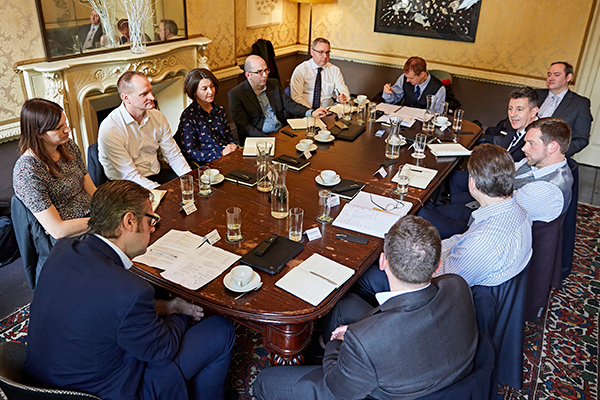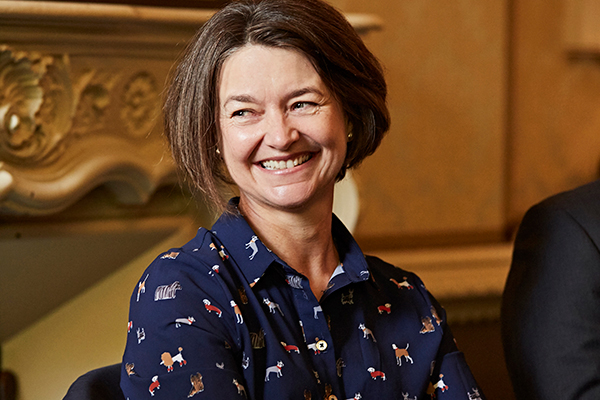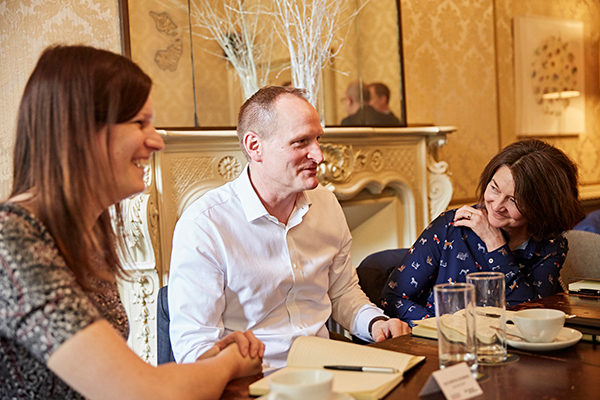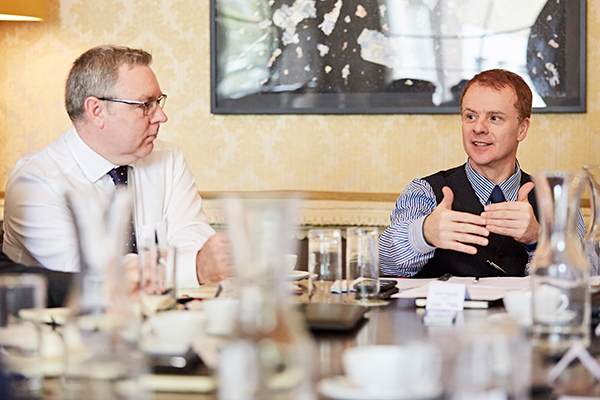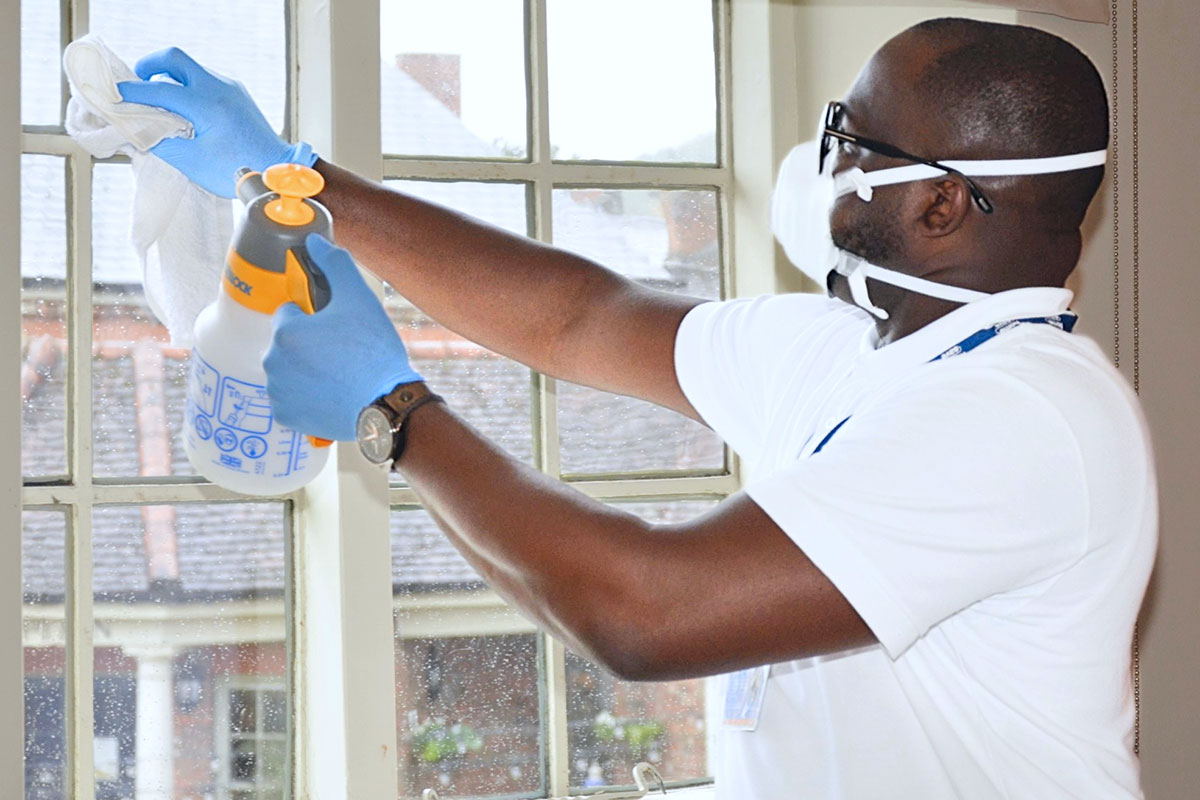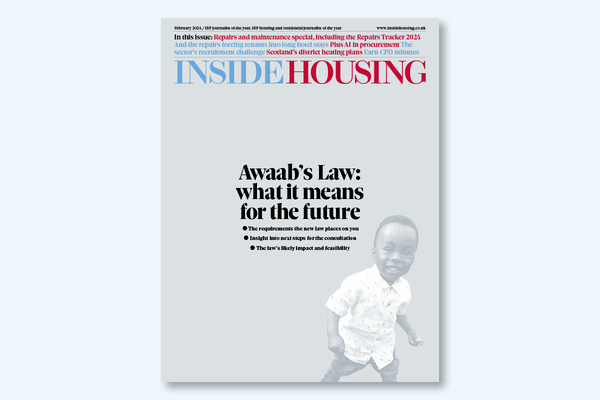The tech explosion
Inside Housing and Hitachi Solutions bring experts together to ask what the future holds for housing associations’ digital offering – and what it will mean for tenants. Photography by Tom Campbell
In association with:

For social landlords a vital part of planning for the future and being fit for purpose in the modern age involves their digital offering and tenant experience.
Most housing associations, however, are still far from delivering a truly integrated service.
Technological and demographic changes mean the sector must alter its approach in order to continue to thrive. The Grenfell Tower tragedy and the Social Housing Green Paper mean that attention is very much focused on their social mission and the way they engage with tenants. Changes to data protection regulations next year also demand close scrutiny.
These were the key issues up for discussion as Inside Housing and Hitachi Solutions gathered 11 senior figures together for a round table that looked to define the future direction of travel for housing associations.
Martin Hilditch, deputy editor of Inside Housing and chair of the session, opens the debate by asking how providers feel the world is changing.
Kathryn Downs, director of IT at Midland Heart, which owns and manages 33,000 homes in and around Birmingham, says landlords need to look at the way they engage with customers more closely – and that technology has a key role to play.
“Digital will be key to everything we do moving forward,” she states. “Technology needs to play a key role in diversifying our communications channels. We’re already seeing it happen with a shift from call centres to social media, and we need to embrace that.”
The tragedy at Grenfell was a touchstone for the discussion. Not only did it underscore the need for closer engagement, panellists suggest, but also for customers to have confidence in the safety of homes, record-keeping, and how personal details are being shared.
Scott Black, director of housing and neighbourhoods at Catalyst, argues that organisations could achieve more if they pool resources in some areas – particularly when it comes to research.
“What does the housing sector do as a collective around digital? If we were the car industry a percentage of our profits would go into a fund for innovation in driverless cars,” argues Mr Black, whose organisation provides more than 21,000 homes in London and the South East. “We have to do more to drive technological innovation to improve customer experience.”
Offering efficiency
David Matthewman, director of IT at Hyde, which manages around 50,000 properties in London and the South East, suggests there is both a strong moral and business case for customer-focused services. “If we can service the customers more efficiently, then we can build more houses, which is what our organisations exist to do.”
Those gathered for the discussion have all been carrying out work in recent years to find out more about their residents and what they want from their landlord. This also allows for better segmentation of customers, so landlords can think about specific offers for different groups. This ranges from the most basic understanding about who is wedded to traditional forms of communication and the growing number who demand a digital dialogue, to the type of renting and ownership options that are likely to work for different groups.
There is, however, one clear direction of travel thanks to the wider operating environment.
Matt Cooney, chief operating officer at PA Housing, which has about 24,000 properties across the Midlands, London and the South East, says: “Our customers’ behaviour is already being driven towards digital. The most excluded of our residents are now claiming their benefits on a digital platform.”
Experiences with businesses like online retailers are also changing expectations.
Michael Bruton, enterprise architecture manager at Sovereign, adds: “Customers don’t live in a bubble. Digital is being used in every other industry.”
Where does the sector stand compared to others, though? Mr Bruton suggests: “Most organisations have a digital offering, but they’re a long way from being the end-to-end [solution] you’ll find in other sectors. We’re not behind in the front end [the website or app]; it’s the back end [the back-room administration and processing].”
Darren Ryland, head of ICT at Longhurst, which has 18,800 homes across the Midlands, offers a blunt assessment.
“We’ve been talking about digital for so long it feels like a bit of a faux subject. We don’t have a holistic business design; we’re dependent on legacy systems; we’re in our infancy in terms of end-to-end models; and tactical reactions to events and mergers detract from businesses’ focus on digital.”
In addition, he says there are embedded factors slowing progress. These include cultural issues, the need to rethink services such as care for digital delivery, and the challenge of competing with the private sector for skills.
The issue of consolidating information from several systems and organisations was a common bugbear.
Peter Hedderly is executive director of business change and IT at Guinness Partnership, one of the country’s largest social housing providers with 65,000 homes. “At Guinness we brought six housing associations onto the same platform,” he reports. “One of the reasons we’re behind as a sector is the depth of the data in the sector; it goes back about 30 years in some cases.
“We’ve had consultants come in who saw it as a challenge, but within a few weeks they’re scratching their heads. It’s so complex.”
Mr Cooney says: “I’m integrating two organisations and I feel like I’m rewiring a jumbo jet while it’s in flight.
“One frustration we have is the lack of a single view of the customer. We have around 42 different systems. Trying to join those things up is the devil’s own job.”
Where PA Housing has 42 separate applications, many large housing associations have 200, says Ian Stanley, director – business development at Hitachi Solutions Europe.
For the past four years Hitachi has worked with Clarion Housing Group, formed late last year through a merger of Affinity Sutton and Circle Housing, to introduce an enterprise-wide IT infrastructure and single enterprise suite.
“The advantage of that is you effectively have all your data in one place, so you see a single version of the truth, and you can have a joined-up, end-to-end process,” Mr Stanley says. “Customer services can follow a case from enquiry to solution and record it all.”
Collating data
While Hitachi Solutions provides tailored architectural software solutions to facilitate a full digital service, there is also an important role for housing associations in the process in terms of locating, retrieving, verifying and collating current data into a usable format.
For Graham Nash, project portfolio manager at Southern Housing, the scale of the challenge in shifting to enterprise-wide systems has nudged the sector to open itself up to experience from other areas. “One of the big changes since I joined Southern a year ago is that the business is supporting IT in making digital happen, and part of that has been strengthening the skills base.” he says. “So I haven’t recruited staff from housing but from the private sector, for their knowledge, drive and new ideas.”
So what do some of those new entrants think? Andy Brown, who became chief operating officer at L&Q following a stint at retail giant Argos, says: “Social housing is between five and seven years behind [on integrating data and dealing with legacy systems].
“But the challenges are now far easier to deal with. The depth of data may be greater in housing than in retail five years ago but so is the processing power today.
“Big data was big news. Now it’s common and we’ve got artificial intelligence. So we can jump whole technologies.” He suggests associations don’t necessarily have to lead the game when it comes to new technology, but potentially make a strategic decision to be a “fast follower”.
Having a clear understanding of what you are doing and why is vital, says Alison Stock, IT director at Riverside, who joined the sector from The Co-operative Group.
“Going forward, it’s about taking control,” she says. “In the past, businesses have put in place systems in an ad-hoc fashion. So it’s about getting a strategic plan, putting in the processes and mechanisms for systems purchases, and getting sign-off from the board.”
Keeping up the positive message, Midland Hart’s Ms Downs – who joined housing from the retail convenience sector – says social landlords are ahead of her former colleagues in terms of technology. But, she argues, they are behind in customer insight.
“Everyone is making decisions on what we believe to be true. But in retail there is a lot of research, and that feels like it’s missing. There needs to be an acknowledgement that we need more research, forums like this, and a more active dialogue with players such as Hitachi.”
Hyde’s Mr Matthewman cites the nascent fintech (financial technology) industry as a likely digital role model. He argues financial bodies have succeeded in delivering services digitally, with a pay-off for both businesses and customers.
“The real digital revolution has yet to come. What we’re going to see in banking is straight through processing [by which the entirety of a financial transaction is handled electronically, with no need to manually re-enter information] and virtual organisations, and those could have implications for us.”
Virtual office
The virtual office is one of the benefits that digital offers, as consolidation creates bigger organisations, states Guinness Partnership’s Mr Hedderly.
“There are lots of roles that are not office based; they’ve just gravitated to offices. This is about pushing those people back out to be closer to customers. They need to be supported by technology and their roles re-thought so that they can follow transactions through from start to finish.”
But even the best-laid plans will have to allow for upcoming legislation, in the form of the General Data Protection Regulation (GDPR) that will define how data is held and how staff interact and access it from next year.
L&Q’s Mr Brown says: “My understanding is that there are greater rights for the end user, [and] the fines [for data protection breaches] are greater. But the rules are fundamentally the same. We’re at a scale where we’re in a position to have done all the third-party testing. So it’s raising the profile of good practice, and educating staff to the risks of not following it.”
Suggestions to drive that good practice include coming up with tighter controls on how staff handle and store data. For example, banning the use of USB sticks to store critical data unless a job function requires it.
Another is using education to drive the cyber security message into the home lives of frontline staff, enabling them to protect themselves from phishing attacks and cyber scams.
Midland Heart’s Ms Downs calls for a more radical approach as digital services move centre stage: “There needs to be a shift of culture. How do we embed best practice around data protection? It’s about annual refresher training, blogging, using the intranet. It’s about how we keep security conversations alive.”
The people gathered around the table today have a mix of housing experience and external insight – perhaps exemplifying a changing sector in itself. Whatever the future looks like, the experts sitting here today will play a key role in shaping it.
Participants
Alison Stock
IT director, Riverside
Andy Brown
Chief operating officer, L&Q
Darren Ryland
Head of ICT, Longhurst
David Matthewman
Director of IT, Hyde
Graham Nash
Project portfolio manager, Southern Housing
Ian Stanley
Director – business development, Hitachi Solutions
Kathryn Downs
Director of IT, Midland Heart
Matt Cooney
Chief operating officer, PA Housing
Michael Bruton
Enterprise architecture manager Sovereign
Peter Hedderly
Executive director of business change and IT, Guinness Partnership
Scott Black
Director of housing and neighbourhoods, Catalyst
